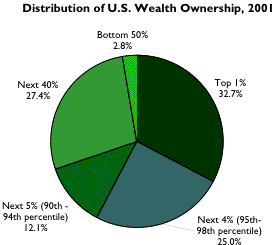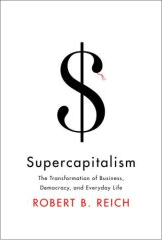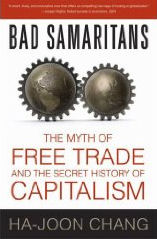

There are two fruitcake religions infecting the USA right now: Kristianity and Ferengiism. By Ferengiism I mean the belief that you must do whatever makes you the most money no matter what the short or long term consequences to yourself or others. It is the state corporate religion.
~ Roedy (1948-02-04 age:70)
If you knew, as I do, the power of giving, you would not let a single meal pass without sharing some of it.
~ Gautama Buddha (563 BC 483 BC age:80)
I wish to argue that capitalism still has some problems. I am not advocating abandoning it. Clearly it is the best approach mankind has developed so far. I merely want to point out that it needs some fine tuning to deal with certain classes of problem.
The modern conservative is engaged in one of man’s oldest exercises in moral philosophy; that is, the search for a superior moral justification for selfishness.
~ John Kenneth Galbraith (1908-10-15 2006-04-29 age:97)
There was a big fire and most of the workers died because they were locked in the building. The few that did survive jumped out of third story buildings and the survivors were the ones who were cushioned by falling on their coworkers below.
Capitalism made the owner of that building lock the workers in. If he did not do that, a rival company would and that other company would be marginally more profitable and would put a company that had proper ways of dealing with fire out of business. The bad and unscrupulous push out the good and ethical. Any decent people are put out of business by unscrupulous ones.
In a similar way, seeking maximum profit compels companies to cut wages, reduce benefits, ignore worker safety, pollute and cheat. It is not enough for a company to be profitable. It must be the most profitable to survive.
This building was in Thailand where there are no government regulations to protect workers. In such circumstances, capitalism forces the employer to spend nothing on fire protection and to lock workers into prevent theft or taking breaks. Were it not for government regulation curbing the capitalist drive for maximum profit, we would see similar tragedies in Canada and the USA.
Liberals feel unworthy of their possessions. Conservatives feel they deserve everything they’ve stolen.With capitalism as religion/life philosophy, those whose consumption is most conspicuous, have the highest status. Waste as a positive value conflicts with the biological practicalities of a sustainable human population on the planet. With 6 billion people to house and feed, we can no longer afford to waste resources.
Mort Sahl

We can have a democratic society or we can have the concentration of wealth in the hands of the few. We cannot have both.
~ Louis Brandeis (1856-11-13 1941-10-05 age:84), Supreme Court Justice from 1916— 1939
Ev’ry morning
Ev’ry evening
Ain’t we got fun?
Not much money,
Oh but honey,
Ain’t We Got Fun?
The rent’s unpaid dear,
We haven’t a bus.
In the winter, in the summer,
Don’t we have fun?
Times are bum and getting bummer,
Still we have fun.
There’s nothing surer:
The rich get rich and the poor get poorer
In the meantime,
In between time,
Ain’t we got fun?
Just to make their trouble nearly double,
Something happen’d last night.
To their chimney a gray bird came,
Mr. Stork is his name.
And I’ll bet two pins
A pair of twins just happen’d in with the bird.
Still they’re very gay and merry,
Just at dawning I heard:
Ev’ry morning
Ev’ry evening
Don’t we got fun?
Twins and cares dear, come in pairs, dear,
Don’t we have fun?
We’ve only started,
As mommer and pop,
Are we downhearted,
I’ll say that we’re not!
Landlords mad and getting madder,
Ain’t we got fun?
Times are bad and getting badder,
Still we have fun!
There’s nothing surer,
The rich get rich and the poor get laid off
In the meantime,
In between time,
Ain’t we got fun?
When the man who sold ’em carpets told ’em,
He would take them away,
They said "Wonderful! here’s our chance!
Take them up and we’ll dance!"
And when burglars came and robb’d them
Taking all their silver, they say.
Hubby yell’d "We’re famous,
For they’ll name us in the papers today!"
Night or daytime,
It’s all playtime,
Ain’t we got fun?
Hot or cold days,
Any old days,
Ain’t we got fun?
If wifie wishes,
To go to a play,
Don’t wash the dishes,
Just throw them away!
Street car seats are awful narrow,
Ain’t we got fun?
They won’t smash up our Pierce Arrow,
They’ve cut my wages,
But my income tax will be so much smaller,
When I’m paid off,
I’ll be laid off.
 |
recommend book⇒The Evolution of Cooperation | |||||||||||||||||||||||||||||||||||||||||||||||||||||||
| by | Robert M. Axelrod | 978-0-14-012495-8 | paperback | |||||||||||||||||||||||||||||||||||||||||||||||||||||
|---|---|---|---|---|---|---|---|---|---|---|---|---|---|---|---|---|---|---|---|---|---|---|---|---|---|---|---|---|---|---|---|---|---|---|---|---|---|---|---|---|---|---|---|---|---|---|---|---|---|---|---|---|---|---|---|---|
| birth | 1939 age:78 | 978-0-465-02122-2 | hardcover | |||||||||||||||||||||||||||||||||||||||||||||||||||||
| publisher | Penguin | B00AHFJ5VS | kindle | |||||||||||||||||||||||||||||||||||||||||||||||||||||
| published | 1990-04-26 | |||||||||||||||||||||||||||||||||||||||||||||||||||||||
| The science of cooperation. How cooperation develops among the selfish and even between warring parties. The key is long term association with the same group. Not all cooperation is good. Oligopolies form by the same mechanism. It explains why strict tit for tat is a sound strategy. It is about the mathematics/strategies that generate revenge spirals and spirals of co-operation. Somebody must have read this book when Britain decided to stop taking two eyes for every eye in Northern Ireland, which eventually lead to bringing terrorism under control. Using computer modeling Axelrod discovers the power of a simple tit for tat strategy in dealing with others. He also discovers the mathematical conditions under which people co-operate, collude, compete, aid each other or refuse to offer reasonable assistance. He also explains the mathematics of why corporations tend toward price-fixing and other co-operative behaviour with their competitors. | ||||||||||||||||||||||||||||||||||||||||||||||||||||||||
| ||||||||||||||||||||||||||||||||||||||||||||||||||||||||
| Greyed out stores probably do not have the item in stock. Try looking for it with a bookfinder. | ||||||||||||||||||||||||||||||||||||||||||||||||||||||||
Behold, this was the iniquity of thy sister Sodom, pride, fullness of bread and abundance of idleness was in her and in her daughters, neither did she strengthen the hand of the poor and needy.
~ Ezekiel 16:49
Money is a co-operative game we humans play to reward each player proportionately to the efforts they expend on behalf of others. Those with fabulous wealth have discovered ways to cheat both the letter and the spirit of the game. They contribute little and take the lion’s share of the pie. They imagine they earned exclusive right to their wealth when in actuality they stole it.
~ Roedy (1948-02-04 age:70)
In the USA, CEO (Chief Executive Officer) ’s of corporations are required by law to act like bastards. They are not permitted to consider the interests of the stakeholders, e.g. the employees, the customers, or the people living where the company does business. They are only permitted to consider the bottom line interest of the stockholders. The corporation by law acts like a psychotic person, someone without a conscience.
 |
recommend book⇒Corporation: The Pathological Pursuit of Profit and Power | |||||||||||||||||||||||||||||||||||||||||||||||||||||||
| by | Joel Bakan | 978-0-7432-4746-7 | paperback | |||||||||||||||||||||||||||||||||||||||||||||||||||||
|---|---|---|---|---|---|---|---|---|---|---|---|---|---|---|---|---|---|---|---|---|---|---|---|---|---|---|---|---|---|---|---|---|---|---|---|---|---|---|---|---|---|---|---|---|---|---|---|---|---|---|---|---|---|---|---|---|
| birth | 1959 age:58 | 978-0-7432-4744-3 | hardcover | |||||||||||||||||||||||||||||||||||||||||||||||||||||
| publisher | Free | B0078XFYQC | kindle | |||||||||||||||||||||||||||||||||||||||||||||||||||||
| published | 2004-02-17 | |||||||||||||||||||||||||||||||||||||||||||||||||||||||
| Based on the Documentary The Corporation available on DVD. It talks about how corporations behave like psychotic humans without concern for morality or the welfare of others. They are single mindedly devoted to profit and the governments give them free reign. Also talks about corporations such as Interface (a carpet maker) who are notable exceptions to the rule. | ||||||||||||||||||||||||||||||||||||||||||||||||||||||||
| ||||||||||||||||||||||||||||||||||||||||||||||||||||||||
| Greyed out stores probably do not have the item in stock. Try looking for it with a bookfinder. | ||||||||||||||||||||||||||||||||||||||||||||||||||||||||
What do I care about the law? Ain’t I got the power?When people get rich enough, they have the power to buy off politicians and law enforcement to let them do whatever they please. That power inevitably corrupts them.
~ Cornelius Vanderbilt (1794-05-27 1877-01-04 age:82)
Poverty is nature’s way of excreting unhealthy, imbecile, slow, vacillating and faithless members of society.To the capitalist, the poor are expendable. The poor are defined as the people with the bottom fifth in wealth. Yet even if everyone on earth were millionaires, toiling 16 hours a day, there would still be a bottom fifth in wealth, whose interests did not matter. Capitalism’s mad desire to torment the poor, is as silly as torturing people because they were not sufficiently tall, or did not consume enough food. For sustainable world, we need to moderate consumption. This mad race for maximal conspicuous consumption takes us in the exact opposite direction.
~ Herbert Spencer (1820-04-27 1903-12-08 age:83)
There are some successes. For example the Canadian federal government formed an oil company called Petrocan to provide some competition to the small number of large oil producers. That competition kept them more honest than they were in the USA. The important thing is the mix of private and public enterprise. Pure public without private competition becomes complacent, just like any monopoly. Unfortunately, the current government is corrupt and is getting rid of Petrocan at the request of the private oil companies, even though Petrocan is a great money maker for the country.
With the current system, the true rulers of the world are the multinational corporations, not the governments. They want to keep things that way.
| Country | % of GNP in 2003 |
|---|---|
| Saudi Arabia | 5.50 |
| Norway | 0.92 |
| Denmark | 0.84 |
| Netherlands | 0.81 |
| Luxembourg | 0.80 |
| Sweden | 0.70 |
| Below 0.7 goal | |
| Belgium | 0.61 |
| France | 0.41 |
| Ireland | 0.41 |
| Switzerland | 0.38 |
| United Kingdom | 0.34 |
| Finland | 0.34 |
| Germany | 0.28 |
| Canada | 0.26
was 0.48 in 1993. It has dropped to 0.25 in 2012 |
| Australia | 0.25 |
| Spain | 0.25 |
| New Zealand | 0.23 |
| Greece | 0.21 |
| Portugal | 0.21 |
| Austria | 0.20 |
| Japan | 0.20 |
| Italy | 0.16 |
| United States | 0.14 |
Americans can take pride though, that because they are the third largest country in the world and because they have largest GNP, that even though they are the stingiest as a percentage of GNP, America is in first place in terms of total contribution to global foreign aid. Unfortunately, national pride makes Americans dwell on this fact and ignore their last place standing by the generosity measure. On the other hand, American foreign aid is often not worthy of the name. It sometimes take the form of weapons. It comes with strings attached, so it could sometimes better be considered bribery. It sometimes does more harm than good e.g. Monsanto seed with terminator genes. And the lion’s share ($6.2 billion of the $14.9 billion the USA provides in foreign aid), goes to Israel, hardly what most would consider a third world needy country.
With only 1/27th of the planet’s population, America takes from the world 1/3 of its natural resources and gives back 1/1000th of its GNP in foreign aid and, like some Biblical hypocrite, trumpets the deed as astoundingly generous. Other industrialised nations are not that much better.
It would take only about $1 billion a year to bring tuberculosis under control, yet somehow, even with trillion dollar budgets, it can’t be found in the combined budgets of the western world. To put this is perspective, this is about 1/4 the amount America spends on lipstick each year.
The international economic system is strongly weighted in favour of the rich nations. The World Bank and IMF (International Monetary Fund) sporadically bail out third world countries, but what is needed is a formal, sustained, reliable flow of money back to the poor countries to level the playing field.
Somehow the conventional wisdom of 200 million sullen South Americans sweating away in the hot sun for the next decade to earn the interest on their debt so Citicorp can raise its dividend twice a year does not square with political reality.
~ Barton Biggs , Managing Director Morgan Stanley Investment Banking.
Professor Milton Friedman’s negative income tax proposes getting rid of all welfare bureaucracies and simply leveling income at tax time. Those with very low income get money back — money to live on for the next year, that might be paid out in installments to help budgeting. Ronald Reagan liked the idea but never implemented it. Negative income tax is similar to a guaranteed livable income. With it, everyone, rich and poor, gets a monthly cheque sufficient for subsistence. At tax time accounts are squared and the rich effectively give the money back and the poor do not. There is no means test and no bureaucracy to decide who is worthy of help. Everyone, rich and poor, housed and homeless is. People have freedom to spend that money anyway they please. You would need a bureaucracy to care for mentally deficient people and drug addicts who could not survive without supervision, but not for people who had no problem other than poverty.
I see in the near future a crisis approaching that unnerves me and causes me to tremble for the safety of my country; corporations have been enthroned, an era of corruption in High Places will follow and the Money Power of the Country will endeavor to prolong its reign by working upon the prejudices of the People, until the wealth is aggregated in a few hands and the Republic is destroyed.Taxation on corporations should discourage bloated monopolies and conglomerates and encourage small and medium-sized businesses. Corporate taxation should be progressive, just like personal tax. The rate should be based on the total income of the conglomerate. Excess profits, aka gouging, should be taxed to discourage companies from schemes to screw the public.
~ Abraham Lincoln (1809-02-12 1865-04-15 age:56)
Where gargantuan size is truly needed, market forces will create size.
The purpose of corporations is to provide goods and services. The means is via raising money for stockholders. You want a tax system than continually reminds corporations of that. Americans particularly are prone to enslaving themselves to corporations. Corporations should be subservient to the public interest.
Money is like manure, it’s no good unless you spread it around.Folk wisdom says everyone prospers if everyone has money to buy the necessities of life. If some don’t, then not only they suffer, but those they would buy from also fail to prosper. In Canada, the family allowance benefits and the GST (Goods and Services Tax) rebates that are the same for rich and poor alike, have this function. Unfortunately, they don’t help those who need it most, the homeless. However, I oppose any sort of program that encourages having more kids.
~ Thornton Wilder (1897-04-17 1975-12-07 age:78) and Jerry Herman (1931-07-10 age:86), Horace Vandergelder in Hello Dolly
In contrast, Reagonomics, aka Voodoo economics, aka trickle down economics holds that concentrating the wealth in the hands of the most wealthy and powerful is the best approach because clearly these people are the movers and shakers and know how to make things happen with money. Everyone will prosper as a result of the increased economic activity. The government will more than make up for its largesse to the wealthy by increased tax revenue from the stimulated economy. Three presidents have tested this theory. What were the results?
The definition of insanity is doing the same thing over and over and expecting a different result.By Rita Mae Brown’s definition, George Bush Jr, is insane.
~ Rita Mae Brown (1944-11-28 age:73) in Sudden Death often misattributed to Benjamin Franklin.Persistence is great, but you must persist with something that works.
Why don’t Reagonomics work?
To the wealthy, the word enough is meaningless.
~ Matt Fair
Politicians know full well the manure theory of economics works and that Reagonomics does not. Why would they persist in the folly of Reagonomics? Why do they disparage the workable manure theory of economic with even less palatable epithets such as communism? I suggest their motives have nothing to do with stimulating the economy. They are simply giving kickbacks for campaign contributions received from the wealthy both over and under the table. Campaign contributions have an astounding ROI (Return On Investment).
Capitalism makes us do many things that will almost certainly make our species go extinct including: creating nuclear weapons, creating artificial plagues, eroding soils, polluting groundwater, wiping out other species at a rate of four a hour — the same rate as the biggest extinction event in earth’s history, burning fossil fuels causing greenhouse gases, widening the gap between rich and poor to the point of fomenting war and terrorism. From Darwin’s point of view, anything that makes your species go extinct in a definite no no.
Here are the main ways you can trick others into giving you money without giving them something of value in return:
The irony is, those most successful in subverting the money system to deflect a huge flow of undeserved wealth to themselves, are the ones who scream loudest about even modest taxes and about how others steal money from them in the form of taxes. They are like bank robbers bitching about being forced the give back 10% of their ill-gotten loot.
It is coming clearer every day that corporations were a bad idea. It was quite naïve to think that an entity that cared for nothing but profit could possibly behave in a responsible way. Corporations are raping the planet, poisoning people, enslaving workers (especially in the third world), corrupting governments and breaking financial promises, all in a mad pursuit of profit at any cost. It feels dangerous to criticise corporations, but this is just because the corporations have kept up a steady drumbeat of pro-corporate propaganda that suggests anyone who had qualms about what corporations do must be some sort of crazed communist traitor. It is all very well to criticise the corporations, but what could replace them?
Corporations have become so powerful they have corrupted the Supreme Court in the USA to give them permission to buy the next generation of politicians with overwhelming amounts of money. They are so powerful they can bribe/pressure/threaten governments to enact laws that nearly all the people do not like. If we don’t stop them, they will destroy the earth with greenhouse gas emissions, leaked genes, pollution, resource exhaustion… We will feel such chumps if we did not even try to stop them.
No matter how much effort we collectively expend, there will always be precisely 50% of the population below average. In Dickens day, we punished such people with indentured servitude and debtors’ prisons (where they had no hope of earning money to pay off the debt or even paying for their food). Today we punish the people of the third world with grinding poverty, pressing our economic advantage to the fullest. Perhaps in some enlightened future time, we will look back on our times as barbaric, when we deliberately tormented the economically disadvantaged.
The key thing to understand is that the elites of the world like things the way they are. They want the poor to be as grindingly poor as possible. It makes them feel better by comparison. The elites are in control of the corporations, the governments and the media. We see only their point of view day after day. Even the poor and middle class are seduced into voting Republican, voting against their own best interest. The only hope I see for cracking this hold on the popular imagination is the Internet, which may gradually supplant TV and newspapers as a more open forum.
I sit on man’s back choking him and making him carry me and yet I assure myself and others that I am very sorry for him and wish to ease his lot by all possible means, except getting off his back.
~ Leo Tolstoy (1828-09-09 1910-11-07 age:82)
 |
recommend book⇒Free Lunch: How the Wealthiest Americans Enrich Themselves at Government Expense (and Stick You with the Bill) | |||||||||||||||||||||||||||||||||||||||||||||||||||||||
| by | David Cay Johnston | 978-1-59184-248-4 | paperback | |||||||||||||||||||||||||||||||||||||||||||||||||||||
|---|---|---|---|---|---|---|---|---|---|---|---|---|---|---|---|---|---|---|---|---|---|---|---|---|---|---|---|---|---|---|---|---|---|---|---|---|---|---|---|---|---|---|---|---|---|---|---|---|---|---|---|---|---|---|---|---|
| birth | 1948-12-24 age:69 | 978-1-59184-191-3 | hardcover | |||||||||||||||||||||||||||||||||||||||||||||||||||||
| publisher | Portfolio Hardcover | 978-1-101-21651-4 | eBook | |||||||||||||||||||||||||||||||||||||||||||||||||||||
| published | 2007-12-27 | 978-0-14-314296-6 | audio | |||||||||||||||||||||||||||||||||||||||||||||||||||||
| B000YJ67LS | kindle | |||||||||||||||||||||||||||||||||||||||||||||||||||||||
| How the American taxation system takes money from the poor to enrich the rich. It is about the fundamental crookedness and unfairness. He names names, how each of the famous rich Americans cheated to get their wealth. | ||||||||||||||||||||||||||||||||||||||||||||||||||||||||
| ||||||||||||||||||||||||||||||||||||||||||||||||||||||||
| Greyed out stores probably do not have the item in stock. Try looking for it with a bookfinder. | ||||||||||||||||||||||||||||||||||||||||||||||||||||||||
 |
recommend book⇒Unequal Protection: The Rise of Corporate Dominance and the Theft of Human Rights | |||||||||||||||||||||||||||||||||||||||||||||||||||||||
| by | Thom Hartmann | 978-1-57954-955-8 | paperback | |||||||||||||||||||||||||||||||||||||||||||||||||||||
|---|---|---|---|---|---|---|---|---|---|---|---|---|---|---|---|---|---|---|---|---|---|---|---|---|---|---|---|---|---|---|---|---|---|---|---|---|---|---|---|---|---|---|---|---|---|---|---|---|---|---|---|---|---|---|---|---|
| birth | 1951-05-07 age:66 | 978-1-57954-627-4 | hardcover | |||||||||||||||||||||||||||||||||||||||||||||||||||||
| publisher | Rodale | |||||||||||||||||||||||||||||||||||||||||||||||||||||||
| published | 2002-10-04 | |||||||||||||||||||||||||||||||||||||||||||||||||||||||
| How corporations have taken control the government and have used terrorism as an excuse to abrogate human rights. How they have used NAFTA and the WTO to squash labour and environmental protection. | ||||||||||||||||||||||||||||||||||||||||||||||||||||||||
| ||||||||||||||||||||||||||||||||||||||||||||||||||||||||
| Greyed out stores probably do not have the item in stock. Try looking for it with a bookfinder. | ||||||||||||||||||||||||||||||||||||||||||||||||||||||||
 |
recommend book⇒Screwed: The Undeclared War Against the Middle Class — And What We Can Do about It | |||||||||||||||||||||||||||||||||||||||||||||||||||||||
| by | Thom Hartmann | 978-1-57675-463-4 | paperback | |||||||||||||||||||||||||||||||||||||||||||||||||||||
|---|---|---|---|---|---|---|---|---|---|---|---|---|---|---|---|---|---|---|---|---|---|---|---|---|---|---|---|---|---|---|---|---|---|---|---|---|---|---|---|---|---|---|---|---|---|---|---|---|---|---|---|---|---|---|---|---|
| birth | 1951-05-07 age:66 | 978-1-57675-414-6 | hardcover | |||||||||||||||||||||||||||||||||||||||||||||||||||||
| publisher | Berrett-Koehler Publishers | 978-1-60509-869-2 | eBook | |||||||||||||||||||||||||||||||||||||||||||||||||||||
| published | 2007-04-28 | 978-1-4332-1514-8 | audio | |||||||||||||||||||||||||||||||||||||||||||||||||||||
| B001AFF25M | kindle | |||||||||||||||||||||||||||||||||||||||||||||||||||||||
This book is simple and somewhat repetitive. It argues five main points.
Hartmann argues that historically the wealthy elite have always worked to eliminate the middle class and hence stomp out democracy. They can then run things for their own ultimate financial benefit. We are going through a period now where the middle class is collapsing as a result of the corporatocracy and wealth of the tiny elite at the top is exploding. Since they control the media, they spread all manner of myths that make people vote against their own self interest in favour of those of the elites. The book also discusses how the war business hijacks government to provide it with endless streams of money for perpetual unnecessary war. | ||||||||||||||||||||||||||||||||||||||||||||||||||||||||
| ||||||||||||||||||||||||||||||||||||||||||||||||||||||||
| Greyed out stores probably do not have the item in stock. Try looking for it with a bookfinder. | ||||||||||||||||||||||||||||||||||||||||||||||||||||||||
If you ignorantly believe there’s not enough life support available on planet Earth for all humanity, then survival only of the fittest seems self-flattering to warrant magna-selfishness. However, it is due only to human’s born state of ignorance and the 99.99 percent invisibility of technological capabilities that they do not recognize the vast abundance of resources available to support all humanity at an omni-high standard of living.
~ Richard Buckminster (Bucky) Fuller (1895-07-12 1983-07-01 age:87) Grunch of Giants
 |
recommend book⇒Grunch of Giants | |||
| by | Richard Buckminster (Bucky) Fuller | 978-0-9740605-1-4 | paperback | |
|---|---|---|---|---|
| birth | 1895-07-12 1983-07-01 age:87 | 978-0-312-35193-9 | hardcover | |
| publisher | Book | B01HH77632 | kindle | |
| published | 2004-03 | |||
| Fuller was one of the first to notice the effects of corporate power and globalisation. He follows the history starting from WW II. | ||||
| Greyed out stores probably do not have the item in stock. Try looking for it with a bookfinder. | ||||
 |
recommend book⇒Supercapitalism: The Transformation of Business, Democracy and Everyday Life | |||||||||||||||||||||||||||||||||||||||||||||||||||||||
| by | Robert Reich | 978-0-307-27799-2 | paperback | |||||||||||||||||||||||||||||||||||||||||||||||||||||
|---|---|---|---|---|---|---|---|---|---|---|---|---|---|---|---|---|---|---|---|---|---|---|---|---|---|---|---|---|---|---|---|---|---|---|---|---|---|---|---|---|---|---|---|---|---|---|---|---|---|---|---|---|---|---|---|---|
| birth | 1946-06-24 age:71 | 978-0-307-26561-6 | hardcover | |||||||||||||||||||||||||||||||||||||||||||||||||||||
| publisher | Knopf | 978-0-307-26785-6 | eBook | |||||||||||||||||||||||||||||||||||||||||||||||||||||
| published | 2007-09-04 | 978-1-4001-3461-8 | audio | |||||||||||||||||||||||||||||||||||||||||||||||||||||
| B000VMBYSY | kindle | |||||||||||||||||||||||||||||||||||||||||||||||||||||||
| Robert Reich was minister of labour under Bill Clinton. He explains how competition between companies for favourable legislation has lead to a sort of lobbying arms race. He explains the consequences, cheaper consumer prices, but also lower wages and less job security. He points out that corporations have no interest whatsoever in community values. It is pointless to expect them to care about global warming, job security, health care etc. They are purely market-driven. He believes this is as it should be. (I strongly disagree. Corporations should be just as responsible as individuals, and all individuals should be personally responsible for their actions they perform on behalf of the corporation.) However, he calls for citizen involvement in government to ensure issues that affect entire communities are properly addressed. | ||||||||||||||||||||||||||||||||||||||||||||||||||||||||
| ||||||||||||||||||||||||||||||||||||||||||||||||||||||||
| Greyed out stores probably do not have the item in stock. Try looking for it with a bookfinder. | ||||||||||||||||||||||||||||||||||||||||||||||||||||||||
 |
recommend book⇒Bad Samaritans: The Myth of Free Trade and the Secret History of Capitalism | |||||||||||||||||||||||||||||||||||||||||||||||||||||||
| by | Ha-Joon Chang | 978-1-59691-598-5 | paperback | |||||||||||||||||||||||||||||||||||||||||||||||||||||
|---|---|---|---|---|---|---|---|---|---|---|---|---|---|---|---|---|---|---|---|---|---|---|---|---|---|---|---|---|---|---|---|---|---|---|---|---|---|---|---|---|---|---|---|---|---|---|---|---|---|---|---|---|---|---|---|---|
| birth | 1963 age:54 | 978-1-59691-399-8 | hardcover | |||||||||||||||||||||||||||||||||||||||||||||||||||||
| publisher | Bloomsbury | 978-1-59691-738-5 | eBook | |||||||||||||||||||||||||||||||||||||||||||||||||||||
| published | 2008-12-28 | 978-1-4233-4684-5 | audio | |||||||||||||||||||||||||||||||||||||||||||||||||||||
| B003Z9L4NA | kindle | |||||||||||||||||||||||||||||||||||||||||||||||||||||||
| Explains some of the forgotten successes of protectionism and the massive failures of free trade, especially for small countries. | ||||||||||||||||||||||||||||||||||||||||||||||||||||||||
| ||||||||||||||||||||||||||||||||||||||||||||||||||||||||
| Greyed out stores probably do not have the item in stock. Try looking for it with a bookfinder. | ||||||||||||||||||||||||||||||||||||||||||||||||||||||||
 |
recommend DVD⇒The Shock Doctrine | |||||||||||||||||||||||||
| DVD | ||||||||||||||||||||||||||
| by | Michael Winterbottom [Director], Mat Whitecross[Director] | |||||||||||||||||||||||||
| birth | 1961-03-29 age:57 | |||||||||||||||||||||||||
| asin | B005CFBZAM | |||||||||||||||||||||||||
| upc | 698452208732 | |||||||||||||||||||||||||
Documents with grisly footage certain themes in US foreign policy ranging from Chile, Argentina, Brazil, Russia, Afghanistan to Iraq including:
| ||||||||||||||||||||||||||
| ||||||||||||||||||||||||||
| Greyed out stores probably do not have the item in stock | ||||||||||||||||||||||||||
This page is posted |
http://mindprod.com/money/capitalism.html | |
Optional Replicator mirror
|
J:\mindprod\money\capitalism.html | |
 |
Please read the feedback from other visitors,
or send your own feedback about the site. Contact Roedy. Please feel free to link to this page without explicit permission. | |
| Canadian
Mind
Products
IP:[65.110.21.43] Your face IP:[216.73.216.57] |
| |
| Feedback |
You are visitor number | |